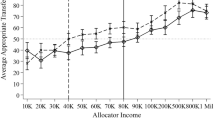Abstract
We report results from a corruption experiment with Indonesian public servants and Indonesian students. Our results suggest that the Indonesian public servant subjects have a significantly lower tolerance of corruption than the Indonesian students. We find no evidence that this is due to a selection effect. The reasons given by the subjects for their behaviour suggest that the differences in behavior across the subject pools are driven by their different real life experiences. For example, when abstaining from corruption, public servants more often cite the need to reduce the social costs of corruption as a reason for their actions, and when engaging in corruption, they cite low government salaries or a belief that corruption is a necessary evil in the current environment. In contrast, students give more simplistic moral reasons. We conclude by emphasizing that results obtained from different subject pools can complement each other in illuminating different aspects of the same problem.
Similar content being viewed by others
References
Abbink, K. (2006). Laboratory experiments on corruption. In S. Rose-Ackerman (Ed.), International handbook on the economics of corruption. Northampton: Edward Elgar Publishing Inc.
Abbink, K. (2002). Fair salaries and the moral costs of corruption. Bonn Econ Discussion Papers.
Abbink, K., Irlenbusch, B., & Renner, E. (2002). An experimental bribery game. Journal of Law Economics and Organization, 18(2), 428–454. doi:10.1093/jleo/18.2.428.
Alatas, V., Cameron, L., Chaudhuri, A., Erkal, N., & Gangadharan, L. (2008). Gender and corruption: Insights from an experimental analysis. Southern Economic Journal (forthcoming).
Alevy, J., Haigh, M., & List, J. (2006). Information cascades: Evidence from a field experiment with financial market professional. The Journal of Finance (forthcoming).
Bardhan, P. (2006). The economist’s approach to the problem of corruption. World Development, 34(2), 341–348. doi:10.1016/j.worlddev.2005.03.011.
Barr, A., Lindelow, M., & Serneels, P. (2004). To serve the community or oneself: The public servant’s dilemma. World Bank Policy Research Working Paper, 3187.
Cadsby, C. B., & Maynes, E. (1998). Choosing between a socially efficient and free-riding equilibrium: Nurses versus economics and business students. Journal of Economic Behavior & Organization, 37(2), 183–192. doi:10.1016/S0167-2681(98)00083-3.
Cadsby, C. B., Maynes, E., & Trivedi, V. U. (2006). Tax compliance and obedience to authority at home and in the lab: A new experimental approach. Experimental Economics, 9(4), 343–359. doi:10.1007/s10683-006-7053-8.
Cameron, L. (1999). Raising the stakes in the ultimatum game: Experimental evidence from Indonesia. Economic Inquiry, 37, 47–59.
Cameron, L., Chaudhuri, A., Erkal, N., & Gangadharan, L. (2006). Propensities to engage in and punish corrupt behavior: Experimental evidence from Australia, India, Indonesia, and Singapore. University of Melbourne, Department of Economics, mimeo.
Carbone, E. (2005). Demographics and behaviour. Experimental Economics, 8, 217–232. doi:10.1007/s10683-005-1464-9.
Cason, T., Gangadharan, L., & Duke, C. (2003). A laboratory testbed for emissions trading in Port Phillip Bay, Victoria. Ecological Economics, 46, 469–491. doi:10.1016/S0921-8009(03)00187-3.
Cason, T., & Noussair, C. (2007). A market with frictions in the matching process: An experimental study. International Economic Review, 48(2), 665–691. doi:10.1111/j.1468-2354.2007.00441.x.
Charness, G., & Rabin, M. (2002). Understanding social preferences with simple tests. The Quarterly Journal of Economics, 117, 817–869. doi:10.1162/003355302760193904.
Cooper, D., Kagel, J., Lo, W., & Gu, Q. (1999). Gaming against managers in incentive systems: Experimental results with Chinese students and Chinese managers. The American Economic Review, 89(4), 781–804.
Croson, R., & Gneezy, U. (2004). Gender differences in preferences: A review of economics experiments. opim.wharton.upenn.edu/~crosonr/publications.html.
Davis, D. D., & Holt, C. A. (1993). Experimental economics. Princeton, NJ: Princeton University Press.
Fehr, E., & List, J. (2004). The hidden costs and returns of incentives—trust and trustworthiness among CEOs. Journal of the European Economic Association, 2(5), 743–771. doi:10.1162/1542476042782297.
Gick, M., & Holyoak, K. (1980). Analogical problem solving. Cognitive Psychology, 12(3), 306–355. doi:10.1016/0010-0285(80)90013-4.
Harrison, G., & List, J. (2004). Field experiments. Journal of Economic Literature, 42(4), 1013–1059. doi:10.1257/0022051043004577.
Harrison, G., & List, J. (2005). Naturally occurring markets and exogenous laboratory experiments: A case study of the Winner’s curse. www.bus.ucf.edu/wp/content/archives/03-14Glenn.pdf.
Kaufman, D. (2005). 10 myths about governance and coruption. Finance and Development, 42(3), 41–43.
Kovalchik, S., Camerer, C., Grether, D., Plott, C., & Allman, J. (2004). Aging and decision making: A comparison between neurologically healthy elderly and young individuals. Journal of Economic Behavior & Organization, 58, 79–94. doi:10.1016/j.jebo.2003.12.001.
Levitt, S., & List, J. (2006). What do laboratory experiments tell us about the real world? pricetheory.uchicago.edu/levitt/LevittCV.html.
List, J. (2003). Does market experience eliminate market anomalies? The Quarterly Journal of Economics, 118(1), 41–71. doi:10.1162/00335530360535144.
Olken, B. (2006). Corruption perceptions vs. corruption reality. http://www.nber.org/~bolken/.
Perkins, D., & Salomon, G. (1988). Teaching for transfer. Educational Leadership, 46(1), 22–32.
Potters, J., & van Winden, F. (1996). The performance of professionals and students in an experimental study of lobbying. papers.ssrn.com/sol3/papers.cfm?abstract_id=2067.
Salomon, G., & Perkins, D. (1989). Rocky roads to transfer: Rethinking mechanisms of a neglected phenomenon. Educational Psychologist, 24(2), 113–142. doi:10.1207/s15326985ep2402_1.
Schmitt, P. M. (2004). On perceptions of fairness: The role of valuations, outside options, and information in ultimatum bargaining games. Experimental Economics, 7, 49–73. doi:10.1023/A:1026210021955.
Author information
Authors and Affiliations
Corresponding author
Additional information
We would like to thank Charles Noussair and the participants of the Experimental Economics Workshop (2006) at the University of Melbourne for their comments. Daniel Piccinin and Revy Sjahrial have provided excellent research assistance. We are grateful to the Australian Research Council and the World Bank for their financial assistance.
Rights and permissions
About this article
Cite this article
Alatas, V., Cameron, L., Chaudhuri, A. et al. Subject pool effects in a corruption experiment: A comparison of Indonesian public servants and Indonesian students. Exp Econ 12, 113–132 (2009). https://doi.org/10.1007/s10683-008-9207-3
Received:
Revised:
Accepted:
Published:
Issue Date:
DOI: https://doi.org/10.1007/s10683-008-9207-3




